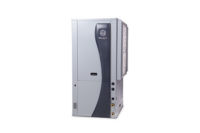Pacific Plumbing Supply came across some found money.
It’s nothing like finding a wallet overflowing with hundred-dollar bills and then not being able to find its rightful owner. This is more like unearthing an extra 2,500 sq. ft. of space at your new headquarters and turning it into an area that propels a division to new heights.
Seattle-based Pacific Plumbing Supply moved into its new 50,000-sq.-ft. headquarters in 2005. However, it did not have an immediate plan for the extra 2,500 sq. ft. of space.
That changed in 2010 when Pacific cut the ribbon on its Green Room, a space that enhanced its radiant heating department and augmented the company’s other traditional plumbing supply departments. With strong leadership and some patience, the company could not be more pleased with the outcome.
“We’ve been very fortunate,” says Daniel Sherman, Pacific Plumbing’s vice president of marketing. “We took a guess and it has worked out.”
Hanging ten
Pacific could have gone the well-traveled route and created a traditional supply house showroom, but Vice President and General Manager Ron Abramson and CEO Larry Solomon felt the time was right to give the radiant and hydronic heating department a showcase space.
“We took our time to sort through and decide what we were going to do with the space,” says Solomon, who has been with Pacific since 1976 and has been CEO since the mid-1980s. “The space kind of sat there while we were developing our other markets. When we got into the radiant and hydronics business it was a time when the utilities were offering fairly significant rebates in several of our markets on high-efficiency products. There was a high demand for high-efficiency products and we caught the wave on that at just the right time.”
When the high-efficiency wave crested in Pacific’s market, it was extremely beneficial for the company to have Joey Longo on its staff. Longo, Pacific’s radiant heating manager, joined the company in 2008 because he saw “an opportunity to start something from the ground up.” The extremely competitive Longo is a longtime Washington state resident, but a native of Brooklyn.
Pacific, which has 150 employees including 40 at its Seattle headquarters, benefits from Longo’s drive and the customer base he brought with him from his previous employer. Longo also brought in targeted trusted industry veterans to fill out Pacific’s roster.
“I’m probably the most aggressive person you’ll ever meet,” he says. “I had a following when I came here. The guys I dealt with over the years were asking, ‘Where are you going?’”
Solomon gives the majority of credit for the booming radiant heating department to Longo.
“We became experts in that territory thanks in large part to Joey Longo,” he says. “He understood that business really well. It’s like when you have a really good quarterback. Joey’s a gifted individual. He’s able to translate technical language and articulate it in normal English to laypeople like me. I’ve learned a great deal from Joey.”
The company offers more than 50 dedicated radiant- and hydronic-related product lines, including: Heat Transfer Products, Triangle Tube, Superstor, Burnham, Weil McLain, Grundfos and Honeywell. In the Green Room, tankless water heaters and boilers hang from the walls so it’s easy for customers and contractors to see the inner workings of the products the company sells. The Green Room also features a pull-down projection screen, room to seat approximately 40 trainees. Sherman notes the space hosts “around 25-30” training seminars a year.
“The training room has been very successful. Not only have we become a point of training on products for our own customers, but it’s also been used by the utility companies for their own purposes,” Solomon says. “It’s been really good for our customers and in return that’s obviously good for us, the wholesaler.”
The benefits of Pacific’s radiant heating division and the Green Room have gone beyond the company’s bottom line. It has spurred more action throughout Pacific.
“(For us) it’s delivering the volume like a good-sized branch would,” Solomon says. “It means more than that. In addition to just the sales and bottom line, it strengthens our relationships with those manufacturers in a way that supports sales throughout the organization. Those opportunities have expanded everywhere.
“As a company, whenever you do something exciting and different it tends to juice things up. It tends to make you look for other creative things to try and develop.”
A new sense of trust
Since 2003, Sherri Norton was hearing the figurative knocks at the door from Billtrust – a billing and invoice company that does a lot of work with wholesalers. Years before that, Pacific’s credit manager encountered issues and lost employee hours trying to get invoices out the door so money could come back to the company.
“Processing our invoices in-house was very labor-intensive,” she says. “It took one person nearly a whole day between getting them printed, tearing them apart, folding and mailing. It was a process. At the time, upgrading our in-house equipment just did not make sense.”
Finally in 2007 it was the right time for Pacific to sit down and streamline its credit department. “We wanted our invoicing to be professional, consistent and to be sent out daily,” Norton says. “We wanted to project who we are at Pacific Plumbing Supply. Anytime you’re using a real person to do everything, including folding, there is bound to be errors. We wanted to present a better image of ourselves. We want to make it as easy as possible for our customers to do business with us, whether it’s getting products, invoices or paying bills.”
Norton says the near six-year partnership between Pacific and Billtrust has been excellent. The company’s bottom line is stronger thanks in part to invoices being emailed, faxed or e-billed to customers by the following morning after a sale. Pacific now delivers 60% of its invoices directly to customer email inboxes or fax machines.
“There is no mail time,” she says. “Even with our customers that still like to have their invoices mailed to them, there are ways we can save on the postage as well.”
Frequent flyer miles
Pacific has 17 locations spread throughout Washington, Alaska and Hawaii. The company established its first of now three Hawaiian locations in 1976 and has three locations in Alaska as well. In 2005, the Anchorage location expanded to a new 30,000-sq.-ft. facility. Solomon says an executive makes a stop at each location outside the continental United States about quarterly to offer support.
Of course, there are some unique problems that come along with the more remote locations. At the top of the list is shipping.
“The biggest challenge is freight,” Solomon says. “We’re constantly evaluating ways to transport materials and looking for improvement efficiencies in ways to do that. We’re in a position where you have to be very careful to account for freight in the goods-landed cost. That’s quite a challenge you don’t have in the lower 48 states.”
Another challenge, one which goes hand-in-hand with shipping, is inventory. In most situations that might occur in Alaska or on the Hawaiian Islands, it’s not as easy for Pacific to get emergency product to those locations or jobsites as it is in the continental U.S. The company stays extra diligent to keep the shelves properly filled at the more remote branches.
“Expectations on inventory turns have to be dropped slightly,” Solomon says. “Hopefully that’s in favor of getting a little bit higher gross margin to offset the investment.”
Even though Pacific’s footprint spans many miles, the company is invested in the communities it serves, the people it employs and the customers who come through the door. Employee and customer events include a Hawaii casino night held at the Ala Moana Hotel in Waikiki and a nine-day premier customer trip at rotating locations such as the Caribbean, Acapulco and Puerta Vallarta, Mexico.
Pacific supports the greater Seattle chapter of Habitat for Humanity (donating more than $150,000 over the past several years) and sets up donation boxes for the Toys for Tots and Northwest Harvest in the will-call areas at Pacific Plumbing locations.
Pacific also hosts an annual charity golf tournament, which for the past 15 years has helped raise more than $170,000 for the Make-A-Wish Foundation.
“Each year our customers and vendors get more supportive even through these last years of increasing unemployment and business challenges,” Sherman says. “Our customers have responded by raising the donation bar every year. Employees and customers alike fill dozens of food and toy boxes each year to help support those less fortunate than ourselves.”
Sherman says Pacific takes steps forward as a company because of its employees and their dedication to core values.
“We’re really fortunate to have high-quality sales guys, accounts payable people, our warehouse crew and executives,” he says. “We’ve been able to attract a great group of people because we’re always trying to listen and get better at our branches.”
When asked to document some of the company’s landmark business decisions or accomplishments, Solomon notes the evolution of Pacific isn’t as much from the top down as it is from the outside in.
“It’s hard for me to think about that in linear terms,” he says. “It doesn’t seem to me that there are particular milestone moments as much as there is an ongoing ambition to do well and serve our customers. It’s based upon a philosophy that we are here to help our customers and listen to them in a genuine manner and we evolve as a result of endeavoring to do that.”








